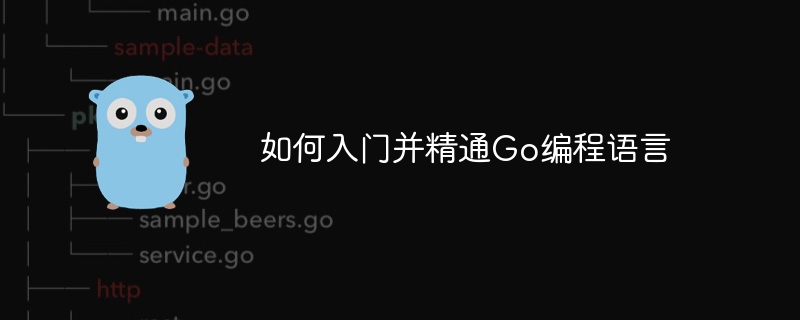Home >Backend Development >Golang >How to get started and become proficient in the Go programming language
How to get started and become proficient in the Go programming language
- WBOYWBOYWBOYWBOYWBOYWBOYWBOYWBOYWBOYWBOYWBOYWBOYWBOriginal
- 2024-03-10 15:21:03616browse

How to get started and become proficient in the Go programming language
The Go language is an open source programming language developed by Google. It has the characteristics of efficiency, simplicity, concurrency, etc., and has been popular in recent years. To be loved by more and more developers. For those who want to learn and become proficient in the Go language, this article will provide some suggestions for getting started and in-depth learning, coupled with specific code examples, hoping to help readers better master this language.
1. Getting started
- Installing Go language
First of all, to learn Go language, you need to install the Go compiler on your computer. You can find the installation package suitable for your operating system on the official website https://golang.org/ and follow the instructions to complete the installation. -
Learn basic knowledge
When learning a programming language, you must first be familiar with some basic knowledge, such as the grammar rules, data types, variable definitions, etc. of the Go language. The following is a simple Hello World program example:package main import "fmt" func main() { fmt.Println("Hello, World!") } - Learn Go language features
Go language has many unique features, such as goroutine (lightweight thread), channel (channel), defer (Delayed execution), these features help developers write efficient concurrent programs. A deep understanding of these features is crucial to mastering the Go language.
2. Advanced stage
-
Learning standard library
Go language provides a rich standard library, including network programming, file operations, and data encryption and other functions. By learning the use of the standard library, you can better understand the core concepts of the Go language. The following is a simple example of file reading and writing:package main import ( "fmt" "io/ioutil" ) func main() { data := []byte("Hello, Go!") err := ioutil.WriteFile("test.txt", data, 0644) if err != nil { fmt.Println("Error writing file:", err) return } content, err := ioutil.ReadFile("test.txt") if err != nil { fmt.Println("Error reading file:", err) return } fmt.Println("Content:", string(content)) } - Learn Go language project structure and engineering
In actual projects, good project structure and engineering can improve the readability of the code and maintainability. Learning how to organize Go language projects and mastering package management tools such as go mod will be the key to your advancement.
3. In-depth stage
- Learn advanced features of Go language
In addition to basic grammar and standard libraries, Go language also includes some advanced features, such as reflection, Interface, concurrency control, etc. Learning these advanced features in depth will allow you to write more elegant and efficient Go programs. - Participate in open source projects
Participating in open source projects is a good way to improve your programming skills. By reading other people's code and cooperating with others, you can better understand and apply the Go language.
Summary:
Learning and mastering a programming language requires continuous practice and practice. As a language with high efficiency and good concurrency, Go language has great development potential. By mastering the basic knowledge, features and project practices of Go language, I believe you will gradually become an excellent Go language developer. I hope the above suggestions and code examples can help you take a step forward in learning the Go language.
The above is the detailed content of How to get started and become proficient in the Go programming language. For more information, please follow other related articles on the PHP Chinese website!

